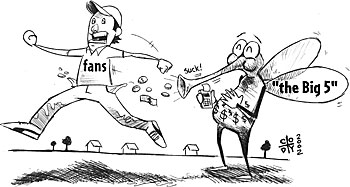
Illustration by Cody Angell
|
By Tylor Brand
Arizona Daily Wildcat
Monday December 2, 2002
Anyone who watches the new commercials put out by the "Big 5," better known as the bastards who control 85 percent of the world's (yes world's) music, almost can't help bursting into tears hearing them describe how selfish mp3 "piracy" is taking food from their mouths. And the tears do flow, accompanied by the phrase: "Ha ha ha ha ha!"
Give us a break! The biggest crock of all is that artists like DMX and Sean "P-faux-ghetto" Combs whine about how the students who survive by scraping old cheese from pizza boxes in the recycling bins (otherwise known as "fans") keep downloading their top 40 songs and forcing them to settle for gold teeth plating instead of platinum.
If there's any reason the artists are starving, or not able to "ice" themselves to the extent they'd like, it's the fault of the record labels. Unless the artist is a high priority signing, everything the company gives the artist is a loan, including recording, video, distribution, etc. that must be repaid. This means that if an artist goes through the promotion and production by the label, they're $430,000 in the hole to the company (estimated by going big label rates and fees). At the going royalty rate of 90 percent of 12-13 percent of what the record company gets (about 88 cents a CD), they're going to have to go gold to break even! How much does the label get a pop? Over $7, but at this point they own the artistic creations of the band, as well as holding the band members as indentured servants, so we can see they deserve it. And don't forget that many of the labels are affiliated with the distributors, so there's another wad of cash in their pockets.
Hearing the "artists"- as though P-whatever has ever had a hit song that wasn't a cheap rip-off of someone else - you'd think that it's equivalent to shoplifting, though shoplifting unarguably carries a bit lighter sentence. But this is where the line must be drawn. Ask yourself: who's the real thief? Is it the person who does the modern day equivalent of taping songs from the radio, or is it the group of wretched serpents whose lives are spent profiting from the work of others?
And the labels are taking this to the next step. They don't care if you're eight or 80, if you're keeping them from selling their CDs, which are 90 percent pablum filler with one equally vapid single, they'll take you down. Legislation from this summer allows them vigilantism in protecting their copyrighted material (justice my ass), so they'll also screw you before they sue you, as they did to Mp3.com, demanding $150,000 per CD that didn't exist but was "stolen." That's one hell of a markup if there ever was one.
The scary thing is how close this hits home. Up until March of last year, the UA's policing of bandwidth for the labels, (basically they watch how much your downloads take when you're getting the latest educational S&M flick, "Citizen Pain", off KazaA), caught and punished 100 people. Fortunately it's mostly a slap on the wrist here, but the people from Music United are perfectly willing to set you or (if you're a minor) your parents back a cool quarter million plus if you're lucky, or a free five-year stay in the federal (or worse, privatized) prison resort for your hedonistic entertainment theft.
Speaking of theft, the Big 5 just lost an anti-trust suit for price fixing, and are currently being forced to cough up $143 million to the states, so look to your local Best Buy and Tower stores (they're all under the same company) for a rebate if you've been suckered into buying anything from these hose bags in the last few years. You might be able to put it toward your $250,000 fine!
But there is a silver lining. DMX, noted for such intellectual fare as "Up in Here," gives us hope that our file-sharing is "killing the industry as we know it." And it's about damn time too!
Here's the solution: Buy as much as possible from indy record companies, from the bands themselves, or from indy record stores - they need it to survive. If you go big label, just think of the hundreds of dollars you've spent on their crap (that's sitting in your closet now), and mirthfully negate their bottom line by downloading what you want, not what they want to feed you.

